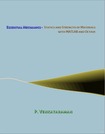
This book covers the requisite theory for the basic study of fluid mechanics at low speeds. This book is unique in that it integrates engineering computation using the popular technical software MATLAB, and the free counterpart Octave. Programming is by example throughout the book. Prior knowledge of programming is not necessary. This book reviews prerequisite topics prior to teaching the subject matter. This book introduces the physics of fluid mechanics based on first principles. It develops the mathematical relations and model of fluid flow so that problems can be defined and solved.
The translation of natural laws into mathematical models includes two approaches. The integral approach is simple though limited. This approach uses assumptions and simplifications that makes it easy to apply and acquire a solution; however, that solutionwill lack detail and merely provide average or overall values. Thus, the integral approach is inadequate for understanding or designing complex fluid systems. On the other hand, it may provide an approximate value with limited effort. It may be able to establish bounds around the true value.
The differential approach is complex but expansive. The solution is established at every point in the flow domain, making it possible to include specific local effects and special properties of the flow.
The topics in this book are illustrated with examples, with most solved by computation. The premise of this book is that science and mathematical concepts are best understood through graphics; therefore, software illustrates solutions through graphical programming. Students are taught and encouraged to explore solutions through graphics.
Essential Fluids With MATLAB and Octave - Part 2 (Applications) will include design and applications based on simple parameterized models that rely mostly on algebra. These are input/output models which are infused with parameters based on empirical data that are read off charts or interpolated from tables.
- Subject:
- Applied Science
- Engineering
- Material Type:
- Full Course
- Author:
- P. Venkataraman
- Date Added:
- 01/15/2024
